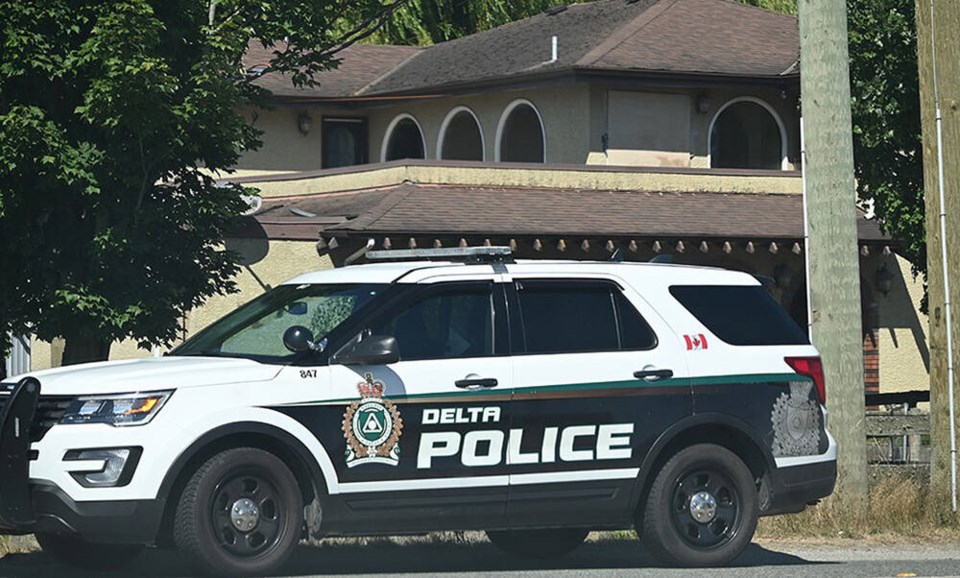The BC Supreme Court has ruled in favour of an application by the Director of Civil Forfeiture regarding a pair of Ladner rural properties that had illegal large-scale marijuana grow operations.
In reasons for judgment released this week, Justice Anita Chan agreed the properties were both used for proceeds and instruments of unlawful activity pursuant to the Civil Forfeiture Act.
The marijuana grow operations were found at two properties in 2021, in excess of the number of plants allowed by licences attached to those properties, owned by Tiantian Liu, Qin Wu and Bin Wu.
In July 2021, the Delta Police Department (DPD) received a report from Delta bylaw officers that there appeared to be a significant amount of cannabis being grown at 4827-28 Ave.
The property was purchased in October 2017 for approximately $3.28 million.
It’s a 10-acre site where bylaw officers were investigating a complaint of a dog being tethered. When they attended, they saw at least seven dogs tethered and spoke with someone, who identified himself as a resident and owner of the dogs.
The bylaw officers also observed a large number of cannabis plants being grown outside and evidence of cannabis being grown inside the various buildings.
The DPD had already been investigating the property, including obtaining Hydro records that showed a high consumption, with the hydro bill for January 2021 alone in the amount of $44,803.
A search warrant was obtained and executed on Aug. 8, 2021. The police seized 7,205 plants and 96 pounds of dry cannabis. Two individuals were found at the scene and they advised that another individual, whose name was on the hydro bill, was in charge of the grow operation.
They also said the homeowners were at the property when the grow equipment was being installed.
The individual on the hydro bill was interviewed and said they paid the rent to the brother of the property owner, and went to that residence, located at 6260-28th Ave., to deliver the payments.
Police started investigating the other property, where there were four licences associated to the site, with 1,540 plants allowed to be grown.
The police conducted surveillance and obtained hydro records. A search warrant was subsequently obtained and then executed on Oct. 28, 2021.
A large scale grow operation was found there as well, with 3,929 plants, more than allowed under the licences. William Wu and Tiantian Liu were present when the police attended.
That second property was purchased in June 2017 for approximately $4.1 million.
The Director of Civil Forfeiture sought an Interim Preservation Orders (IPO) for both properties, alleging that they are both proceeds and instruments of past unlawful activity. The Director sought the orders to preserve the value of the properties until forfeiture proceedings can be determined.
The defendants argued the police conduct resulted in serious breaches of their Charter rights, and as such, the court would likely order the evidence excluded from a trial.
They also argued the police failed to provide “full and frank disclosure” in the information to obtain the search warrants, used by bylaw officers to further the investigation and, among other things, used the criminal law to gather evidence with no intention of pursuing criminal charges.
The Director of Civil Forfeiture, however, argued the defendants had not established any arguable breaches of their Charter right.
The judge agreed, ruling the contentions made by the defendants were speculative and not grounded in evidence.
According to the ruling, there is also evidence that the whole or a part of an interest in the properties was acquired directly or indirectly as a result of the illegal grow operations. For example, the rent paid by the tenants to use the properties for the grow operation could be used to pay expenses of the properties, such as the mortgage payments.
The ruling notes that once this threshold has been met, an IPO is mandatory, unless a preservation order is clearly not in the interest of justice.
The terms allow the defendants to retain their right to occupy or lease the properties provided they maintain them and do not encumber them without the permission of the Director. The judge also agreed with the Director that in order to preserve the property, it is important for the Director to know who will be occupying the premises.



